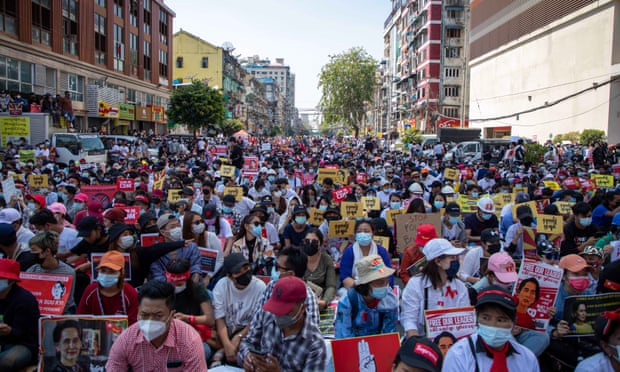Hackers in Myanmar have targeted key state websites, including the military’s propaganda page, as part of an online battle with the junta, which has repeatedly imposed internet shutdowns and blocked social media sites, the Guardian reported.
A group called Myanmar Hackers disrupted websites including the Central Bank, the military-run propaganda agency True News Information Team and state-run broadcaster MRTV, as part of a civil disobedience movement designed to prevent the junta from functioning.
“We are fighting for justice in Myanmar,” the hacking group said on its Facebook page. “It is like mass protesting of people in front of government websites.” A website provided links for protesters to join in what appeared to be denial-of-services attacks.
The online protests came as hundreds of thousands of people took to the streets on Wednesday in some of the biggest rallies since the coup on 1 February.
Drivers blocked key junctions by parking their cars with bonnets open across the roads, while crowds of striking bank workers, students, engineers and farmers marched through the streets, calling for the release of their election politicians.
In Mandalay, Myanmar’s second-biggest city, railway workers prevented trains from running but were forcibly dispersed in the evening by security forces who opened fire, injuring one person, according to Reuters.
Aung San Suu Kyi, who has been kept under house arrest since the military seized power, faces two charges – including an allegation that she illegally imported walkie-talkies – and appeared in court by video link on Tuesday. If convicted, this could prevent her from running in future polls.
The authorities have attempted to halt the civil disobedience campaign by imposing a ban on gatherings, and have detained almost 500 people over recent weeks. Arrest warrants have also been issued for six local celebrities, including film directors, actors and a singer, who had encouraged civil servants to join the protest. The charges can carry a two-year prison sentence.
The military has urged civil servants to return to work and threatened action against those who do not do so. At a press conference on Tuesday, a spokesperson suggested that protests would dwindle and that most of the population supported the coup. Such comments appear to have further infuriated people, however, prompting huge turnouts at Wednesday’s rallies. There are no signs of strikes easing.
The military has justified seizing power by alleging widespread voter fraud in November elections won by Aung San Suu Kyi’s party, a claim dismissed by observers. It has promised to hold fair elections, though many are sceptical.
As part of the junta’s attempts to quash dissent, it has prepared a draft law that would criminalise many online activities and tighten internet surveillance. At 1am on Thursday the military imposed another internet shutdown, according to NetBlocks, a group that monitors internet outages around the world. It reported that internet connectivity had dropped to just 21% of ordinary levels.
The military has also attempted to block social media sites including Facebook and Twitter, which have been used by protesters to organise. Many have flocked to virtual private networks (VPNs) to try to overcome the restrictions. Top10VPN, a digital security advocacy group, reported a 7,200% increase in local demand for VPNs in the immediate aftermath of Facebook being banned on 4 February.
Cybersecurity expert Matt Warren from Australia’s RMIT University told AFP that protesters’ efforts to hack government websites were mostly aimed at generating publicity.
“The sorts of attacks they would be undertaking are denial-of-service attacks or defacing websites which is called hacktivism,” he said. “The impact will be potentially limited but what they are doing is raising awareness.”
More about: #Myanmar
















































